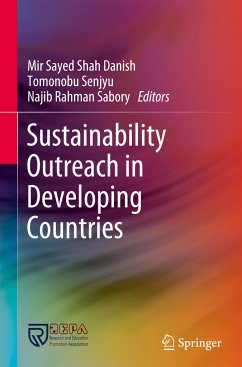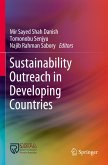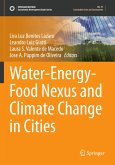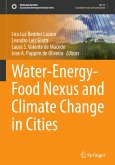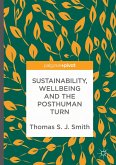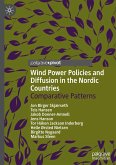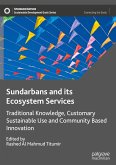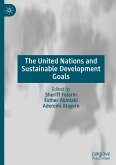Sustainability Outreach in Developing Countries
Herausgegeben:Danish, Mir Sayed Shah; Senjyu, Tomonobu; Sabory, Najib Rahman
Sustainability Outreach in Developing Countries
Herausgegeben:Danish, Mir Sayed Shah; Senjyu, Tomonobu; Sabory, Najib Rahman
- Gebundenes Buch
- Merkliste
- Auf die Merkliste
- Bewerten Bewerten
- Teilen
- Produkt teilen
- Produkterinnerung
- Produkterinnerung
This book presents a comprehensive collection of recent research on the timely topic of sustainable development goals, with a focus on developing countries. In this manner, it furnishes interdisciplinary coverage in terms of sustainable development; it sets forth the pillars of sustainability (environmental, technical and technological, social, institutional, and economic disciplines); and it explores the adaption of these pillars for long-term sustainability.
With its survey of transboundary research, experiences, and lessons learned, the book offers integrated conceptual and empirical…mehr
Andere Kunden interessierten sich auch für
![Sustainability Outreach in Developing Countries Sustainability Outreach in Developing Countries]() Sustainability Outreach in Developing Countries97,99 €
Sustainability Outreach in Developing Countries97,99 €![Water-Energy-Food Nexus and Climate Change in Cities Water-Energy-Food Nexus and Climate Change in Cities]() Water-Energy-Food Nexus and Climate Change in Cities112,99 €
Water-Energy-Food Nexus and Climate Change in Cities112,99 €![Water-Energy-Food Nexus and Climate Change in Cities Water-Energy-Food Nexus and Climate Change in Cities]() Water-Energy-Food Nexus and Climate Change in Cities121,99 €
Water-Energy-Food Nexus and Climate Change in Cities121,99 €![Sustainability, Wellbeing and the Posthuman Turn Sustainability, Wellbeing and the Posthuman Turn]() Thomas S. J. SmithSustainability, Wellbeing and the Posthuman Turn41,99 €
Thomas S. J. SmithSustainability, Wellbeing and the Posthuman Turn41,99 €![Wind Power Policies and Diffusion in the Nordic Countries Wind Power Policies and Diffusion in the Nordic Countries]() Jon Birger SkjærsethWind Power Policies and Diffusion in the Nordic Countries30,99 €
Jon Birger SkjærsethWind Power Policies and Diffusion in the Nordic Countries30,99 €![Sundarbans and its Ecosystem Services Sundarbans and its Ecosystem Services]() Sundarbans and its Ecosystem Services84,99 €
Sundarbans and its Ecosystem Services84,99 €![The United Nations and Sustainable Development Goals The United Nations and Sustainable Development Goals]() The United Nations and Sustainable Development Goals128,39 €
The United Nations and Sustainable Development Goals128,39 €-
-
-
This book presents a comprehensive collection of recent research on the timely topic of sustainable development goals, with a focus on developing countries. In this manner, it furnishes interdisciplinary coverage in terms of sustainable development; it sets forth the pillars of sustainability (environmental, technical and technological, social, institutional, and economic disciplines); and it explores the adaption of these pillars for long-term sustainability.
With its survey of transboundary research, experiences, and lessons learned, the book offers integrated conceptual and empirical contributions from diverse interrelated fields. Viable options are set forth for societies in transition in the twenty-first century to achieve well-being in the lives of their people through the eradication of poverty, mitigation of climate change, promotion of lifelong learning opportunities, and empowerment of society. These options also make it possible to deploy affordable energy, sustain economic growth, offer innovation, reduce inequality, and finally, to help ensure global sustainability.
With its survey of transboundary research, experiences, and lessons learned, the book offers integrated conceptual and empirical contributions from diverse interrelated fields. Viable options are set forth for societies in transition in the twenty-first century to achieve well-being in the lives of their people through the eradication of poverty, mitigation of climate change, promotion of lifelong learning opportunities, and empowerment of society. These options also make it possible to deploy affordable energy, sustain economic growth, offer innovation, reduce inequality, and finally, to help ensure global sustainability.
Produktdetails
- Produktdetails
- Verlag: Rahkaar Research and Education Organization / Springer / Springer Nature Singapore / Springer, Berli
- Artikelnr. des Verlages: 978-981-15-7178-7
- 1st edition 2021
- Seitenzahl: 224
- Erscheinungstermin: 19. September 2020
- Englisch
- Abmessung: 241mm x 160mm x 18mm
- Gewicht: 463g
- ISBN-13: 9789811571787
- ISBN-10: 9811571783
- Artikelnr.: 59619492
- Herstellerkennzeichnung Die Herstellerinformationen sind derzeit nicht verfügbar.
- Verlag: Rahkaar Research and Education Organization / Springer / Springer Nature Singapore / Springer, Berli
- Artikelnr. des Verlages: 978-981-15-7178-7
- 1st edition 2021
- Seitenzahl: 224
- Erscheinungstermin: 19. September 2020
- Englisch
- Abmessung: 241mm x 160mm x 18mm
- Gewicht: 463g
- ISBN-13: 9789811571787
- ISBN-10: 9811571783
- Artikelnr.: 59619492
- Herstellerkennzeichnung Die Herstellerinformationen sind derzeit nicht verfügbar.
Mir Sayed Shah Danish Assistant Professor Mir Sayed Shah Danish (Dr. Eng., MBA, CEng., SMIEEE, MIET) has been an engineering and technology expert and an academician for several years. He demonstrates a simple, in-depth style of narration of concepts, turning concepts into measurable endeavors and exploring interdisciplinary coverage in a systematic manner. Apart from being a scientific scholar, he brings together multidisciplinary skills and expertise (energy, environment, business, and management) providing integrated solutions. He is the author of several academic and technical textbooks, guidebooks, training manuals, and other books in English and Dari (Persian) Languages. These publications have enabled him to link industry with academia, and he has achieved recognition with several awards and expressions of appreciation. Since 2004, Dr. Danish has been involved in multidisciplinary engineering and technology by leading several projects in those fields while continuing as an active scholar and educator. He is an assistant professor at the University of the Ryukyus, Japan; founder and chair of the IEEE-Sustainable Energy and Intelligent Engineering Society (SEIES-PES & FRID joint chapter, Fukuoka Chapter); founder and facilitator of the Rahkaar IET On-Campus Society; Founder of the Rahkaar Research and Education Organization; and founder and president of the Research and Education Promotion Association (REPA). Dr. Danish has worked with national and international organizations and companies as an urban electric power planner, team leader, technical advisor, department head, educational manager, and director. He is a chartered engineer, UK (CEng.), senior member of IEEE, member of IET (MIET), and holds membership in many other academic societies. He received his bachelor's degree in electrical and electronic engineering (B.Sc.) in 2009 from Kabul University, Afghanistan); two master's degrees, one in energy and electrical engineering (M.Sc.) in 2015 from the University of the Ryukyus, Japan; the other in business administration (MBA) in 2016 from the National Institute of Business Management, India); and a doctorate in sustainable energy (Ph.D.) in 2018 from the University of the Ryukyus. He chaired and has been a committee member of several conferences and symposiums and has more than 50 publications. His main research interest is sustainable energy (policy, economics, market, environment, and management), smart cities and housing, storage systems, voltage stability, and related areas. Tomonobu Senjyu Professor Tomonobu Senjyu was born in Saga Prefecture, Japan, in 1963. He received his B.S. and M.S. degrees in electrical engineering from the University of the Ryukyus, Nishihara, Japan, in 1986 and 1988, respectively; and his Ph.D. degree in electrical engineering from Nagoya University, Nagoya, Japan, in 1994. He is currently a full professor with the Department of Electrical and Electronics Engineering, the University of the Ryukyus. He is an active scholar who makes not only theoretical and practical contributions to the industry but, as well, helps to produce valuable human resources in his graduates. Most of his students are from developing countries, pursuing their studies under Japanese government scholarships. He has supervised tens of Ph.D. dissertations since 2004. His former students are now actively involved in industrial and academic fields throughout the world. Professor Senjyu leads the Power Energy System Control Laboratory (PESC), which employs recent technology and produces novel research outcomes. His laboratory publishes several peer-reviewed journals each year. He has made salient contributions to many international journals and has more than 500 peer-reviewed publications in high-ranking academic databases to his credit. His research interests are in renewable energy, power system optimization and operation, power electronics, and advancedcontrol of electrical devices. Najib Rahman Sabory Associate Professor Najib Rahman Sabory graduated from Electrical and Electronics department of engineering school at Kabul University in 2001. Since then he has been teaching in this department. From 2009-2011, he served as the deputy dean for the Engineering school at Kabul University. After a Fulbright scholarship was awarded to him in 2011, he completed a master's degree in Sustainable Energy and a graduate certificate in Project Management from A. James Clark School of Engineering at University of Maryland College Park. He has also earned an MBA in 2014 from World Wide Science Academy in Malaysia. Mr. Sabory was awarded a UNITAR (United Nations Institute for Training and Research) fellowship in 2007 for a period of seven months. He learned many advanced concepts in project management, leadership and change management. He later remained in this program for 2008 and 2009 cycles as coach and resource person. Mr. Sabory has participated in a series of workshops and symposiums about leadership and entrepreneurship back in US. In 2011, Mr. Sabory led an Inter-ministerial Commission for Energy (ICE) committee for preparing capacity building strategy for energy sector of Afghanistan. Currently Mr. Sabory serves as Associate professor and head of the Energy Department of engineering school at Kabul University. He is also the deputy chairman of Afghanistan Renewable Energy Union (AREU) since early 2017. Moreover, he is the rotating chairman of Afghanistan Awareness and Analysis (A3), a Kabul based Think-Tank.
Chapter 1. Energy and Environment Efficiencies Towards Contributing to Global Sustainability.- Chapter 2. A Concise Overview of Energy Development within Sustainability Requirements.- Chapter 3. Aligning Smart City Indicators for Sustainability Outreach: A Case Study.- Chapter 4. Optimal Merging of Transportation System Using Renewable Energy-based Supply for Sustainable Development.- Chapter 5. Smart and Sustainable Township: An Overview.- Chapter 6. An Empirical Analysis of Sustainability Indicators in An Administrative Complex Design from Urban Planning Perspective.- Chapter 7. Distributed Generation Model for Achieving Environmental Scenario: Loss Reduction and Efficiency Improvement.- Chapter 8. Solar Energy Market and Policy Instrument Analysis to Support Sustainable Development.- Chapter 9. Sustaining the Public Transport Network by Adaptation from Monocentric to Polycentric Structure.- Chapter 10. Sustainable Transportation and Mobility System in Kabul City.- Chapter 11. From Consumers to Producers: Energy Efficiency as a Tool for Sustainable Development in the context of Informal Settlements.- Chapter 12. Efficient Use of Energy and Its Impacts on Residential Sector: A Step Towards Sustainable Building.
Chapter 1. Energy and Environment Efficiencies Towards Contributing to Global Sustainability.- Chapter 2. A Concise Overview of Energy Development within Sustainability Requirements.- Chapter 3. Aligning Smart City Indicators for Sustainability Outreach: A Case Study.- Chapter 4. Optimal Merging of Transportation System Using Renewable Energy-based Supply for Sustainable Development.- Chapter 5. Smart and Sustainable Township: An Overview.- Chapter 6. An Empirical Analysis of Sustainability Indicators in An Administrative Complex Design from Urban Planning Perspective.- Chapter 7. Distributed Generation Model for Achieving Environmental Scenario: Loss Reduction and Efficiency Improvement.- Chapter 8. Solar Energy Market and Policy Instrument Analysis to Support Sustainable Development.- Chapter 9. Sustaining the Public Transport Network by Adaptation from Monocentric to Polycentric Structure.- Chapter 10. Sustainable Transportation and Mobility System in Kabul City.- Chapter 11. From Consumers to Producers: Energy Efficiency as a Tool for Sustainable Development in the context of Informal Settlements.- Chapter 12. Efficient Use of Energy and Its Impacts on Residential Sector: A Step Towards Sustainable Building.

